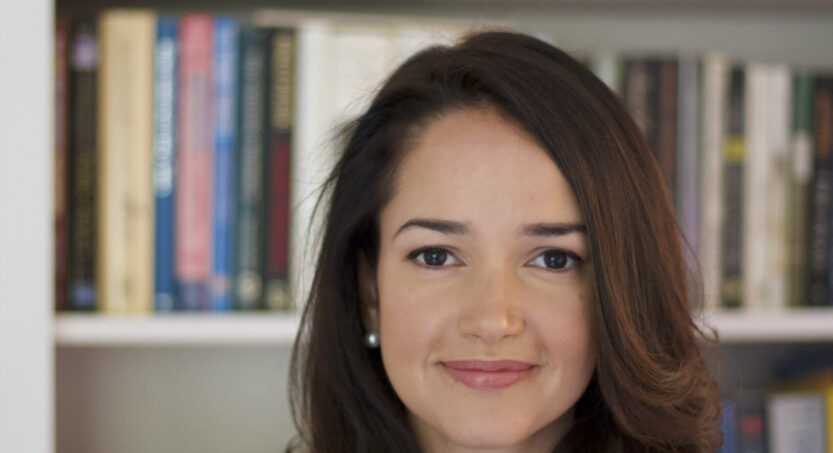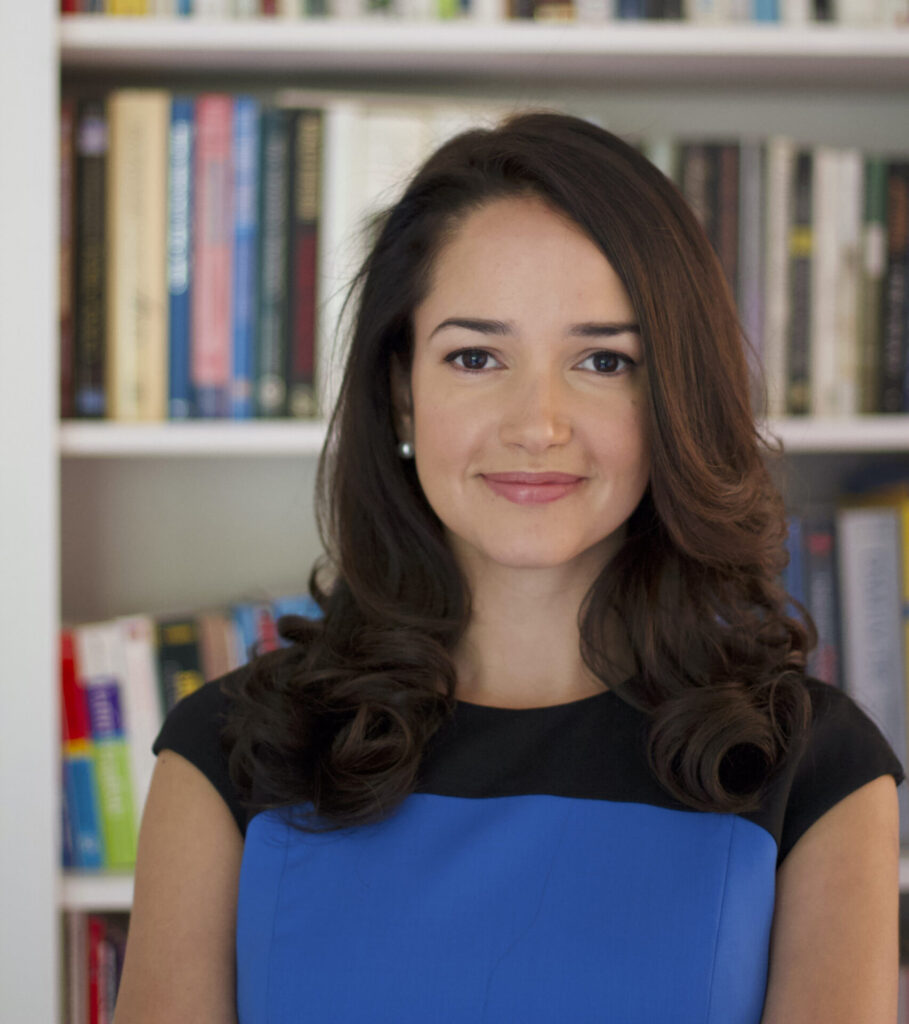
This story starts in the republic of Armenia, a developing nation, which became independent 31 years ago with the dissolution of the old Soviet Union. It might seem an odd starting point for a story about the new CEO of the Centre for Social Impact (CSI) – Arminé Nalbandian – but on her own admission, her anecdote reveals something about her.
Arminé was born in Armenia, educated in Boston, London, and Sydney, and returned to Armenia years later to assist the National Competitiveness Foundation of Armenia.
“There I was, showing up at Cabinet meetings very Soviet-style Armenian ministers, and the one thing I didn’t speak was Russian at the time,’’ Arminé recalls. “My parents obviously growing up in the Soviet Union were a bit reticent to teach us Russian – it was their secret language – and I walked into the [Cabinet] room, and they knew I couldn’t speak Russian, so immediately switched to speaking Russian.

“I think you’ll find in my character the result of that experience was that I not only worked ridiculous 12-hour days but then would go and study Russian in the evenings, sometimes falling asleep at the desk, to a point where I could understand what they were saying. It was an incredible experience…’’
Responding to challenges, an appetite for hard work and a deep commitment to social policy are common themes in Arminé’s career, whether it’s as a Fulbright Scholar, her most recent role as Deputy Chief of Staff and Director of Policy to the former NSW Premier Gladys Berejiklian, the NSW Aboriginal Land Council or her time at the National Competitiveness Foundation of Armenia.
“I have a background in social policy issues,’’ Arminé explains. “It’s always been a personal interest, the area I’ve always chosen to focus on even when there have been other opportunities that people think I should be focusing on, I always head back there.’’
Her mother was a social worker in a disadvantaged area of Boston and died when Arminé and her older sister Ani were still young. Armine was aged four and Ani eight when the family left Armenia for the USA. “I was born behind the Iron Curtain, so I was always in this interesting place and very acutely aware of how different my circumstance was to those who had stayed behind, and that sparked an interest in me from a very young age, in public policy and in social policy,’’ Arminé says.
“I’d been on a journey to discovering how I could have the most positive impact as an individual to in some way repay the debt and hopefully more than pay it forward but create a different structure for future generations to exist in.’’
The sisters established the Diruhi Foundation (named after their mother) to help realise their mother’s desire to help provide more social work and mental health support for Armenian youth. Arminé acknowledges that the intensity of her recent work commitments had meant the Foundation became “a bit dormant’’.
“I’m still thinking constantly about how we can carry on [my mother’s] legacy: she was extremely passionate about those questions of equality of opportunity and how do you fix truly structural disadvantages, things that are truly challenging,’’ Arminé says.
“Armenia is a developing country and is a long way behind on its mental health journey and that was something we were focused on in the early part of the founding of the organisation.’’
The challenges and complexities of international development became part of Arminé’s education. After her graduation as a Presidential Scholar from Northeastern University in Boston, Arminé went to the London School of Economics, initially to study international relations but found herself absorbed in what she calls “the development issue because you could see the massive highs and lows of what it means to live in a developing country.’’ Opportunities opened up for her, and she received an invitation to return to Armenia to work on a new organisation, called the National Competitiveness Foundation, designed to focus on strategic economic opportunities. It was then she embarked on her acquisition of Russian language skills.
The experience helped sharpen her thinking about the predicaments confronting developing nations. “There is a philosophical challenge there – what does the West do? And what does it mean to engage in development? I actually really got stuck on that question – it was a real challenge for me,’’ Arminé says. “Are we even doing the right thing? How are we doing this? What does this mean? What does it mean to work with the people on the ground, from a grassroots level, to not just get buy-in but that they build it with you and their ideas coming to the fore? And that part of the job was really, really interesting, trying to bring together a lot of the aid agencies, there was a huge co-ordination problem on the ground. Not unique to the former Soviet Union but I think that experience solidified my bent towards working on social issues. It’s very hard for me to turn away from those issues…’’
Arminé’s focus, more recently, has been on the pandemic, a global problem with deep local consequences and challenges for governments. Being so close to the decision-making in NSW – and understanding how high the stakes were for everyone – gave Armine a particular insight in the importance of long-term planning. That included acknowledging the importance of investing, over years, in the NSW public health team to ensure the state government was able to respond to the pandemic’s impact. But perhaps the most telling lesson was something fundamental – the power of information.
“For me, my greatest learnings were relying on high quality information from everywhere…being really open: What are the ideas out there? And being really targeted and routine about how you make decisions in the short term. I think in a crisis, that’s vital,’’ Arminé says.
There was something else to discover too: the close working relationship between the bureaucracy and the political arm of government, working through a crisis cabinet that included public servants, identifying the best thinking, research, and strategy from a range of sources, and plotting the way forward.
“I had a birds-eye view of how the public service and the political class work functionally together in a really productive way and how you can help create the conditions for that to continue and to create the trust that needs to be there and the very healthy disagreement, and how we have those conversations about disagreement,’’ she says.
Now, in her new role she has an opportunity to explore in a different (non-crisis) setting how politics can best use good policy. “I have never had a greater appreciation of how important it is to communicate clearly, empathetically and consistently than I gained during the pandemic,’’ Arminé explains. “That is something I will definitely take away and if that had not been there, it would have been very difficult to explain some of those complex decisions and why they were taken.’’
She is refreshingly upbeat about her political experience, describing it as “…a gift.’’
“I joined government to understand how the pointy end works and I think I had gotten what I needed to get out of that experience, which was to have a deep understanding of how apolitical and political government work to achieve public good,’’ she says.
In many ways, it provides the setting for Arminé’s arrival at CSI. Armed with the broad experience and the enduring interest in social issues, Arminé has already identified the broad themes engaging her thinking. One element will be to help co-ordinate and work collaboratively across the private, government and for-purpose sector.
“From my perspective, CSI is a world-class organisation. It has immense capacity…,’’ she says. “I’m really interested in thinking what are the issues coming up– what are we facing? I look at the world in front of me now and there’s a tectonic shift in attitudes towards social issues. This generation coming up is looking at these issues very differently.’’
“Even the changing corporate landscape – which is still nascent – but towards stakeholder capitalism, increasing focus on ESG but what is the rigour behind ESG? How do we make that rigorous and the academy has a fantastic role in that conversation and that’s something I’d really like to focus on.’’
She’s aware of the frustration that arises from a range of stakeholders trying to arrive at a strategy or solution to a social issue. “Because of my experience at the pointy end, because of all the stakeholders in the social sector I’ve had to deal with – privileged to deal with: government, private sector stakeholders – there’s just this immense co-ordination problem that’s frustrating to see from the inside because you think, because we often want the same outcome, but we can’t get in a room to solve it,’’ Arminé says.
“I see that as a very solvable problem, and I have a lot of ideas…. ‘’
She does refer to her “eternal optimism’’, and there’s a genuine air of excitement about what CSI can do, leveraging off its expertise across four universities.
“The model is something I’ll have to learn about. My understanding and the way I have seen it at least externally is that it is an immense asset of people who work on similar issues across the country from different perspectives and different circumstances,’’ she says. “You’re getting the best of all of the thinking in one place. And I’m looking forward to embedding myself into this structure.’’
And ‘impact’ lies at the heart of her vision of success. “Success will look like being able to take what an immense asset this institution is – to take the best of the institution, which is world class researchers, high quality education, taking that as the grouping of people and saying: ‘What is it that you individually and collectively produce and how can we maximise the impact of that?’ How can we take that and apply it to a problem, such as creating robust structures and frameworks underneath the ESG problem? Or creating new ways of collaborating across spaces for scale.’’
In the meantime, though, she’s enjoying the thrill of starting a new role.
“It’s one of those things when you find yourself staying up past midnight thinking about ideas, you know it’s the right place for you,’’ she says. “I’m excited by all the opportunities.’